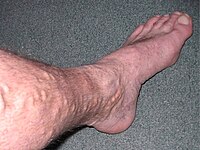
Photo from wikipedia
Purpose: The aim of this study was to evaluate complications in patients with head and neck venous malformations (VMs) treated with foam sclerotherapy using sodium tetradecyl sulfate (STS). Methods: The… Click to show full abstract
Purpose: The aim of this study was to evaluate complications in patients with head and neck venous malformations (VMs) treated with foam sclerotherapy using sodium tetradecyl sulfate (STS). Methods: The authors retrospectively evaluated the complications, pain. and degree of satisfaction in 69 consecutive patients affected by cervicofacial VM managed with STS using the Tessari method in a single institution. Results: The average number of procedures for each patient was 2.1. The most frequent complication was blistering. We observed 1 patient of temporary weakness of a facial nerve branch, 1 paradoxical embolism, and 1 orbital compartment syndrome. The average pain score was 0 (no pain at all) (51.5%). There was no statistically significant correlation between patient satisfaction and the presence of complications or the degree of pain. Conclusions: Sclerotherapy with STS is an effective treatment that yields to very high patient satisfaction. This procedure has an overall low complication rate and is usually effective within a few sessions. However, severe complications may occur; these must be pointed out in the informed consent and the surgeon must be aware of and ready to quickly treat them to prevent long-term sequelae.
Journal Title: Journal of Craniofacial Surgery
Year Published: 2017
Link to full text (if available)
Share on Social Media: Sign Up to like & get
recommendations!